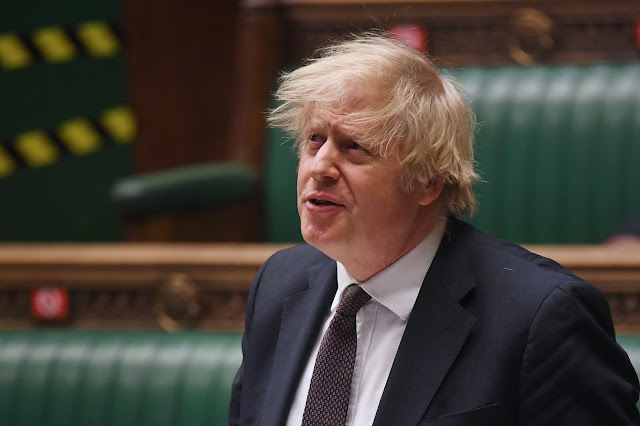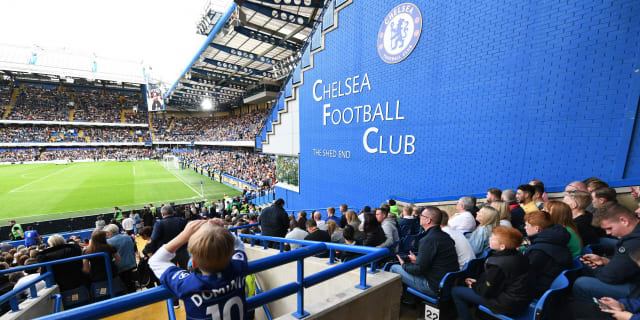 |
| Picture: Jessica Taylor/Twitter/@Jess__Taylor__ |
I would normally run a country mile to stay out of politics, but having been confined to a hospital bed for the last 19 days, with only Sky News and reruns of Minder to occupy the mind, it’s been hard not to be absorbed by the maelstrom consuming Alexander Boris de Pfeffel Johnson. His defensive line, and that of the ministerial stooges sent out to bat for him, has been that the rows over how the Downing Street flat redecoration was paid for, whether or not he'd allegedly said “let the bodies pile high in their thousands” to avoid another lockdown, the Dyson text affair and even the Greensill lobbying scandal, are all of little national consequence. Johnson and his acolytes, whenever pressed, have pushed the message that outside the Westminster bubble none of this political ‘rough and tumble’ counts, and that most people are more interested in their COVID jabs and getting a holiday abroad this year.
Westminster is, I’d agree, invariably an introspective pit of self-absorbtion. One of the most bizarre aspects of the government response to the pandemic has been the Downing Street press conferences, wherein Boris or the minister-du-jour gives a scripted speech, hands over to the experts for slides, then invites a couple of pre-recorded questions from Joe Public before facing scrutiny from the working media. Those with a mistrust of journalists have objected to the provocative questioning from heavyweight, if divisive, politicos like the BBC’s Laura Kuenssberg or Sky’s Beth Rigby, regarding them as irrelevant when pitched after enquiries from regular folk about when they’ll be able to hug Granny again. But as self-serving as the media scrutiny can be, the chaos currently surrounding Boris underlines the fundamental importance of being able to hold politicians to account.
When you take a step back from the micro dramas swirling around Johnson, a picture emerges of a character whose leadership appears pinned to charisma alone, rather than any discernible management skill. For as long as he's been in public office, his blathering, Eton-educated P.G.Wodehouse persona depicted in his hapless guest hosting experience of Have I Got News For You? has projected a form of eccentricity that has masked whatever strength he might actually bring to the party. Moreover, it has certainly exposed his myriad weaknesses. But something got him into power; something has appealed to voters, repeatedly, to get him elected, first as an MP, then mayor of London, and latterly prime minister. Even factoring in the Brexit pledge that was central to his 2019 general election victory, you have to conclude that the public is either enamoured by Johnson’s appeal or brazenly immune to his deficiencies.
 | |
| Picture: Jessica Taylor/Twitter/@Jess_Taylor_ |
Read any profile of Boris and the image of a bumbling but slightly endearing prat has been his perennial schtick. I encountered him myself in Copenhagen a few years ago when I was attending the COP17 climate change conference, and he was there as London mayor. Unlike the pomp and ceremony that accompanied Barrack Obama (who flew in on Air Force One with the usual presidential entourage and city-wide security lockdown), or even Prince Charles, who turned up with a vast supporting army including his own film crew, I ran into Boris shuffling about on his own, anorak and copious backpack making him look more like a misplaced tourist at Kings Cross station. There are stories aplenty of his financial woes and frugality, though this seems more about disorganisation rather than any fundamental regard for economy. As editor of The Spectator, Johnson reportedly asked interns to fetch him vending machine coffees without paying for them. Another story, concerning a dinner for former Daily Telegraph editor Bill Deedes, saw Boris allegedly welch on the £40 everyone had been asked to cough up to cover the bill. Such fiscal absent mindedness is matched by the dysfunction in Johnson’s private life, what with claims of serial womanising - inside and outside of marriage - and questions about how many children he has actually fathered. Again, this can be regarded as tittle-tattle, irrelevant to professional performance, but without taking a moralising tone, you start to accumulate a picture of someone singularly incapable of running a bath, let alone the country.
Hypothetically, transplant Boris out of public life and into the private sector: if he was the CEO of a quoted company it would be hard to imagine any board of directors having much stomach for the drip-drip-drip of reputation-damaging antics. Some CEOs sort of get away with apparent zaniness - Richard Branson and Ryanair’s Michael O’Leary spring instantly to mind - but while the photo ops might be good for PR, reputation matters. Attritional reputational damage can, over time, erode a brand, impacting both investor and consumer sentiment (viz. G. Ratner). I’ve worked professionally in this area a long time, and have been embroiled in various exercises in damage-limitation, though thankfully, nothing along the same lines that 10 Downing Street and Conservative Central Office will be enduring right now. My experience has been mostly confined to addressing media speculation about M&A gossip and the occasional executive slip-up. If done right, corporate communications functions are well prepared. Own goals can mostly be avoided, even if that means putting up executives who have been media trained to within an inch of their lives. Authenticity does count, as does honesty. In a crisis the advice is always to get your arms around the problem quickly, and to communicate 'little and often'. That does not seem to be the approach being applied by Boris. The chaos that has, for as long as he’s been in the public eye, surrounded him like the dust cloud around Pig-Pen in the Peanuts cartoons, has been allowed to develop. Perhaps deliberately, as if to project some sort of flawed genius, but we’re now at a point where all these streams of dysfunction are meeting at the same delta. We’ve gone from ‘wacky Boris’, dangling from a zipwire in a publicity stunt for the 2012 Olympics, to own goals that seriously question his integrity, and which are not being resolved by obfuscation and the defensive line that no-one outside Westminster cares about it all.
Richard Nixon was ultimately undone by Watergate. The very real prospect of Boris being undone by the relative triviality of new wallpaper is ridiculous. It is now being seen, on top of the ‘bodies’ story and the Greensill claims, as being the worst of his offences and, now the Electoral Commission has stepped in, even raising the prospect of criminal charges if it is found that Johnson has breached rules of disclosure. No one can deny a prime minister the right to customise their home above the shop (and everyone entering the office gets a £30,000 grant to do so), but without knowing who commissioned what, to be undone by claims of “illegal” donations for having the flat tarted up is farcical self-injury. But, then, it does fit in to another pattern of behaviour - Boris’s love of vanity projects. As London mayor he spaffed millions on the failed ‘garden bridge’ project and plans for the ‘Boris Island’ airport in the Thames Estuary. As prime minister, he’s spent £2.5 million on a new press conference suite in Downing Street in the middle of the COVID-induced financial crisis, while there are strong rumours that he wants to commission a replacement for the royal yacht Britannia as a platform for driving international trade. Then there was the expensive repainting of one of the RAF’s Voyager tanker-cum-transport aircraft so that it flies the flag, Air Force One-style, when shipping VIPs abroad (meaning that when the plane is on military refuelling duties, it’s bright white colour scheme with red-white-and-blue tail fin is in stark contrast to the standard grey paint for the RAF’s combat aircraft). All PR stunts, to some extent.
 |
| Picture: Jessica Taylor/Twitter/@Jess_Taylor_ |
Are all these items erroneous? Not necessarily, but they still point to a Boris Johnson more concerned with trivialities than more important matters of state. And the fact that some of them harm or at least bruise his reputation goes hand in hand with other weaknesses in his leadership, not the least of which being the assembly of a Cabinet populated by lightweights like Priti Patel, Gavin Williamson, Grant Shapps and Liz Truss, plus the walking anachronism that is Jacob Rees-Mogg. All were seemingly appointed in reward for their Brexit loyalty rather than any notable administrative quality. And, then, there was the appointment and staunch endorsement of Dominic Cummings, even through the Barnard Castle debacle seriously undermined Johnson’s own “Stay home. Protect the NHS. Save lives” slogan.
Again, to make the corporate analogy, there’s not a company in the world that could endure such constant aggravation, even in the most unexpected of business crises. Shit happens in any life, private or public, but character and leadership are the most important aspects of ensuring your stakeholders are on board with you. Perhaps Boris likes to see himself as a maverick (along with the much-discussed notion that he is Winston Churchill-incarnate). Perhaps he is a maverick. There is sometimes a borderline between these states of being. You can never tell whether a Liam Gallagher or John Lydon are deliberately awkward, revelling saying “Boo!” (or worse) aggressively, or whether it’s a just a confected image. You could ask the same of Boris: is the dishevelled hair and the hopeless bobble hat-and-shorts jogging combo concocted to endear himself, or is that just a what-you-see-is-what-you-get statement? Maybe. But like it or not, image does count. And the hair and saggy suits merely add to the apparent cavalier attitude Boris consistently applies across most other aspects of his life.
Little of this is, to my knowledge or, for that matter, anyone else’s, of real consequence. No one - even Her Majesty’s Opposition - believes that Boris is a bad person per se. Even if the Electoral Commission finds that offences have been committed over the Lulu Lytle wallpaper, it’s hardly worthy of carting him off to Belmarsh. But add it all up - the petty misdemeanours, gaffes, dysfunction, chaos and, yes, a propensity for dishonesty - and you have to objectively question whether Boris Johnson is fit to serve. He might be a colourful figurehead, but he's also governing the world’s fifth largest economy, a G7 member and one of five permanent members of the United Nations Security Council. If he can’t organise the redecoration of his grace-and-favour flat within the correct transparency protocols, how is he expected to have his finger on the nuclear button? I’ll just leave that there.













